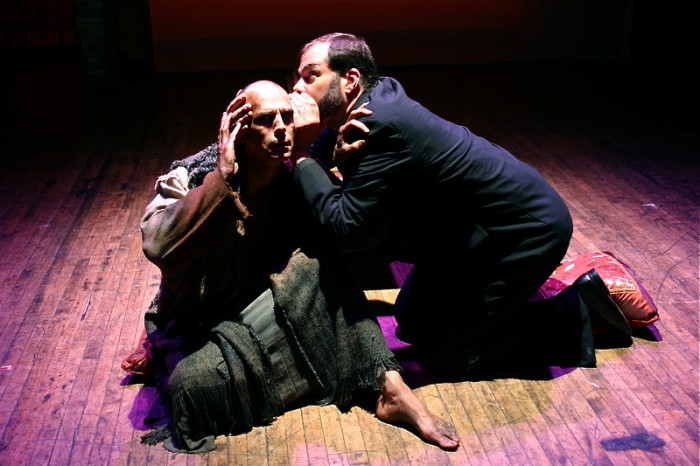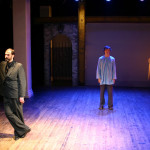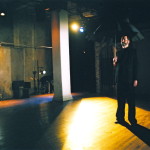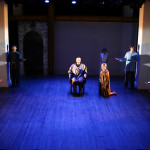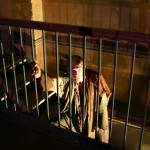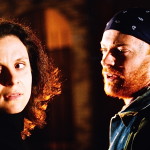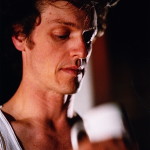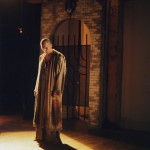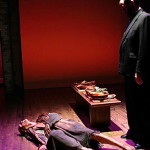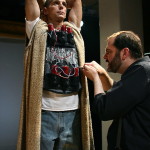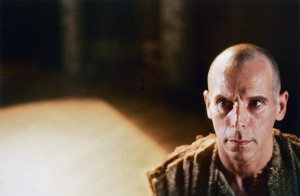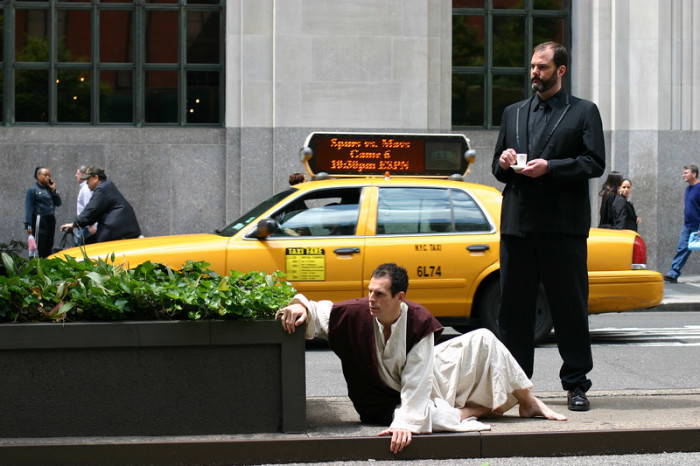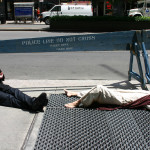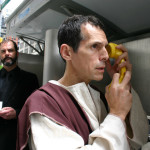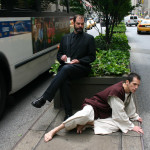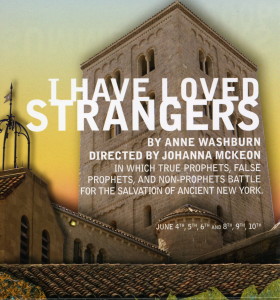Photos by Carl Skutsch and The Hinge Collective
Above, from top: T. Ryder Smith and Jay Smith; Jay Smith, James Stanley, T. Ryder Smith; Jay Smith; ensemble; T. Ryder Smith; Laura Flanagan and Jeff Biehl; James Stanley; T. Ryder Smith; T. Ryder Smith and Jay Smith; same; T. Ryder Smith
Excerpts from the reviews
Full reviews are below
“‘I Have Loved Strangers’ . . . introduces us to a fragmented portrait of New York City. It moves among several disparate stories and characters: a Biblical King and a prophet who bears him bad news; a modern urban guru and his wife, whose marriage struggles in the gap between fear and optimism; and the wife’s friend, who leads a group of domestic terrorists operating underground. The play eventually weaves these separate poetic strains into a tale of a self-destructive motley crew of urbanites who are unsure of what they want from themselves, each other, and the world around them. . . Once the play settles into itself, and the actors are allowed to connect and develop relationships, the production begins to take off. The story seems to unfold in both a Biblical and a modern era simultaneously, causing me to take even more time to catch up to what these people and their stories had to do with each other. I was unsure of how our Biblical prophet transcended time to arrive in the NYC apartment with the terrorists. By the time the play came to its dramatic climax, I wanted to care more about the paradox of ideals these people find themselves confronting than I’d been allowed by the structure of the text. . . This was a particular shame because the cast seem so willing to commit to whatever the play throws them. Standing out are the two prophets: T. Ryder Smith as Jeremiah reminded me of how beautiful an actor’s instrument can be when stretched to its physical limits. His body continually flowed over the line between beautiful and grotesque movement, and sold me on his ability to channel the word of God. James Stanley as Hananiah, the play’s gentler prophet, succeeds in keeping his more poetic language grounded in a personal truth. His gentleness and humility provide a perfect counterpoint to the possessions of Smith. Also noteworthy in this production is Jay Smith, the Non-Prophet/King who activates McKeon’s brave silences with magnetism and depth, deftly crossing over the boundaries between good and evil, trust and betrayal, fear and power. . . Overall, I was thrilled by the production’s magical moments. . . Washburn’s text tackles huge ideas through some truly personal conflicts and engaging characters, but much of the poetry felt self-conscious to me, maybe better read than dramatized. I deeply invested in the story once I was allowed to access it, and found myself wishing Washburn would take one more step back and allow the characters to fully take over the play.“ Tomi Tsunoda, nytheatre.com
“A fantastic tale of a battle for survival that may have no winners in a city that may have no future. . . a superb cast that includes the always-amazing T. Ryder Smith . . . ” Ludlow Lad blog
Publicity
Photos by Carl Skutsch
Full reviews
OffOffOnline.com, Les Hunter – Prophet Taking. Sunday school was never terribly interesting. But unbeknownst to my 12-year-old self, the Bible is filled with the kinds of juicy stories about sex, death, and destruction that should make any adolescent salivate. I Have Loved Strangers, a new work by the excellent Clubbed Thumb company and part of its “Summerworks 2006” series at the Ohio Theater, draws on Bible stories about prophets, placing them in present-day New York City. The problem here is that there are far too many plots, characters, and anachronisms. Although there are a few shining moments as well as some good acting, what mainly results is a confusing work that attempts to do too much. The play takes place in a New York that is like a modern-day Babylon. With elements of the stories of both Jeremiah and Ezekiel, it tries to weave together three different plotlines about prophets and prophecies. What emerges, however, is not a melding of the old and the new but a stiff hodgepodge of conflicting narratives. The three stories are disjointed and seemingly unrelated, and are tied together only toward the end. Scenes from different plotlines are juxtaposed for maximum confusion. Not until late in the production does one finally begin to understand who each character is. The first story has to do with a prophet in rags, Jeremiah (T. Ryder Smith), who by dress and speech seems to belong more to the Bible than the Big Apple. Not unlike the biblical Ezekiel, he breaks a bottle to symbolize the imminent destruction of the land, although it is not clear if this destruction is destined for New York or Jerusalem. Jeremiah is first seen wandering aimlessly among contemporary Manhattanites, who are choreographed moving in sync in a manner closer to dance than drama. As the urbanites discuss funny and entertaining “slice-of-life” tidbits that would appeal mainly to an audience of New Yorkers (“Smith Street used to be a dump, but now it’s really nice”), Jeremiah appears to be a lunatic prophet of doomsday, not unlike the contemporary kind. He could easily be wearing a placard that says, “Repent! The end draws near.” His story is in stark contrast to that of the far more mellow Hananiah, a new age prophet (and, in the Bible, a false one). He appears in domestic scenes with his wife, who is greatly swayed by his charisma. With his good looks, quick smile, and impervious self-assuredness, one could easily imagine him as a charming cult leader. The scenes between Hananiah (James Stanley) and his wife, Ruthie (Jennifer Ruby Morris), are funny at first, placing the seemingly otherworldly character of a prophet in a quotidian setting for a domestic satire, replete with such marital problems as miscommunication, petty fights, and bruised egos. The first scenes are quite amusing and fresh, but the narrative becomes more serious and tedious as the unhappy couple’s relationship steadily worsens.
The third story line has to do with a ragtag group of revolutionaries who seem like the Weather Underground radicals of the 60’s and 70’s. Though it is not clear what they are fighting for and whom they are fighting against, their struggle slowly becomes part of the other two stories, leading to an explosive ending. There is also a fourth, half-told, and seemingly unrelated story line that involves two unnamed persons wandering through a forest, visiting a cemetery, and watching fireflies. Throughout most of these scenes, the theater is dark, and the actors are seen by the flashlights they carry. As Jeremiah, Smith astutely assumes the role of someone who has become a medium of God. He writhes on the floor, bends his back and trembles, and appears to be in great pain and fear, not knowing what he will say next and how much trouble it will get him into. Stanley, as the hunky Hananiah, has a winning smile and easy affability that makes it easy to understand why his wife, played in a suitably understated fashion by the vivacious Jennifer Ruby Morris, has fallen for his charms. Despite his seemingly sweet veneer, he also shows signs that he is a sinister, manipulative figure desperately trying to control his wife.
The set is quite minimal: a terracotta-colored screen as a backdrop and a castle-like gate to add to the biblical feel. I Have Loved Strangers is a challenging piece that, in moments, uses ironic humor to show a biblical figure in modern-day life. It also raises interesting questions about the nature of prophets and why people follow them. Overall, though, this overambitious production has an ambiguous quality that never quite lets the audience know exactly what is going on. Ultimately, we would profit from a bit more clarity. 6-7-06
New Theatre Corps, Nicholas Linnehan – Clubbed Thumb presents I Have Loved Strangers, by Anne Washburn, as part of its Summerworks Festival. The play, directed by Johanna Mckeon, delves into issues of good versus evil and morality. Two prophets, played by T. Ryder Smith and James Stanley, foretell very different stories of things to come. One tells of destruction, while the other one offers hope and triumph. This leaves the audience pondering who the true prophet is, or perhaps they both share truth. The actors in these roles fill their characters with passion and honesty so well that it is hard to decide who is prophetic and who is crazy.
Laura Flanagan (Emily) adds to a strong ensemble by delivering a profound performance as the complex terrorist trying to fight the resistance. She also brings much-needed humor into this intensely serious play. Equally compelling is Jennifer Ruby Smith (Ruthie) who plays the wife of one of “prophets”. Her character struggles with her ability to trust in her husband’s gift. She delivers well with her ability to show the inner struggle of the woman. Both these women fill their characters with honesty and vibrant energy that engages the audience.
While this play does not offer any definitive answers to the questions it raises (how could it?). It provokes one to think, question, and contemplate. While it may take an audience member a while to “digest” the poignancy of this piece, it is definitely worth seeing and thinking about. It is a shame that few plays today tend to do this, which makes I Have Loved Strangers a great piece of theater! 6-10-06
Ludlow Lad blog – Clubbed Thumb kicks off this year’s Summerworks with Anne Washburn’s I Have Loved Strangers – and they’re off to a great start. The play, set in “Ancient New York,” is a fantastic tale of a battle for survival that may have no winners in a city that may have no future. Johanna McKeon expertly directs a superb cast of seven that includes the always-amazing T. Ryder Smith as the prophet Jeremiah and the funny and touching Jennifer Ruby Morris as Ruthie who may be the wife of another prophet – or is he a terrorist? It’s unfortunate that the play will only be here for a week, but hopefully I Have Loved Strangers will have another life in the near future. 6-4-06
nytheatre.com, Tomi Tsunoda – Anne Washburn’s I Have Loved Strangers, first of this year’s new plays at Clubbed Thumb’s Summerworks festival, introduces us to a fragmented portrait of New York City. It moves among several disparate stories and characters: a Biblical King and a prophet who bears him bad news; a modern urban guru and his wife Ruthie, whose marriage struggles in the gap between fear and optimism; and the wife’s friend Emily, who leads a group of domestic terrorists operating underground. The play eventually weaves these separate poetic strains into a tale of a self-destructive motley crew of urbanites who are unsure of what they want from themselves, each other, and the world around them. The production begins as a primordial sea of phrases, characters, and choreographic patterns. Exploiting the expanse of the Ohio Theatre, director Johanna McKeon places most of this story on a bare, transformative stage, which takes more shape as the story itself comes further into focus. The cast moves through the bare stage trying to activate seemingly unrelated snippets of text through seemingly unrelated characters and moments. Although this was true to the nature of the writing, I found myself drifting during this section. Aside from a general picture of an urban world with shifting points of focus, I found little to hold onto through the first third or so of the play. Once the play settles into itself, and the actors are allowed to connect and develop relationships, the production begins to take off. The story seems to unfold in both a Biblical and a modern era simultaneously, causing me to take even more time to catch up to what these people and their stories had to do with each other. I was unsure of how our Biblical prophet transcended time to arrive in the NYC apartment with the terrorists. By the time the play came to its dramatic climax, I wanted to care more about the paradox of ideals these people find themselves confronting than I’d been allowed by the structure of the text. This was a particular shame because the cast seem so willing to commit to whatever the play throws them. Standing out are the two prophets: T. Ryder Smith as Jeremiah reminded me of how beautiful an actor’s instrument can be when stretched to its physical limits. His body continually flowed over the line between beautiful and grotesque movement, and sold me on his ability to channel the word of God. James Stanley as Hananiah, the play’s gentler prophet, succeeds in keeping his more poetic language grounded in a personal truth. His gentleness and humility provide a perfect counterpoint to the possessions of Smith. Also noteworthy in this production is Jay Smith, the Non-Prophet/King who activates McKeon’s brave silences with magnetism and depth, deftly crossing over the boundaries between good and evil, trust and betrayal, fear and power. However, Laura Flanagan’s construction of Emily, the patriot terrorist, seemed a forced caricature of someone who cares deeply about politics and activism, rather than a truthful engagement in Emily’s deep drive and conflicted identity.
Set designer Michael Carnahan and lighting designer Driscoll Otto smartly take advantage of the six tall, imposing columns in the theater’s natural architecture, lending the world of this play a sense of sacredness and grandeur. The emotion of the lights underscores the poetry of the text and magnitude of its ideas. The upstage wall consists of a large scrim flat and a gorgeous door that looks crafted from rods of iron, set inside a vaulted brick doorway. But although it is used as an entrance/exit, sometimes creating striking images, it never takes on the dramatic significance its design seemed to suggest. Overall, I was thrilled by the production’s magical moments. The entire team seemed undaunted by huge, theatrical ideas, which was exhilarating and a rare treat. Director McKeon takes gorgeous and gutsy risks with silence and darkness, and navigates the shifting text with integrity and passionate imagery. Washburn’s text tackles huge ideas through some truly personal conflicts and engaging characters, but much of the poetry felt self-conscious to me, maybe better read than dramatized. I deeply invested in the story once I was allowed to access it, and found myself wishing Washburn would take one more step back and allow the characters to fully take over the play. 6-5-06
[previous] [next]
